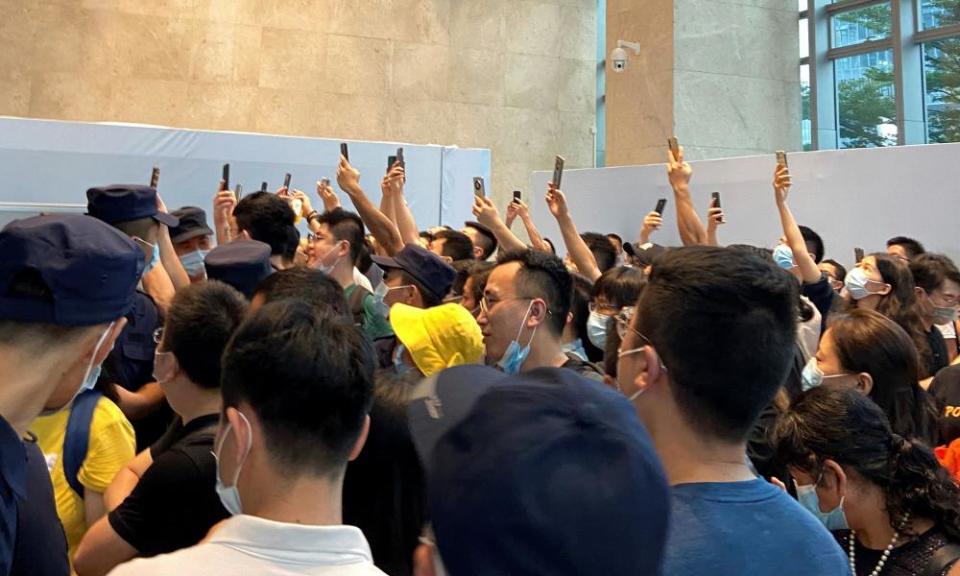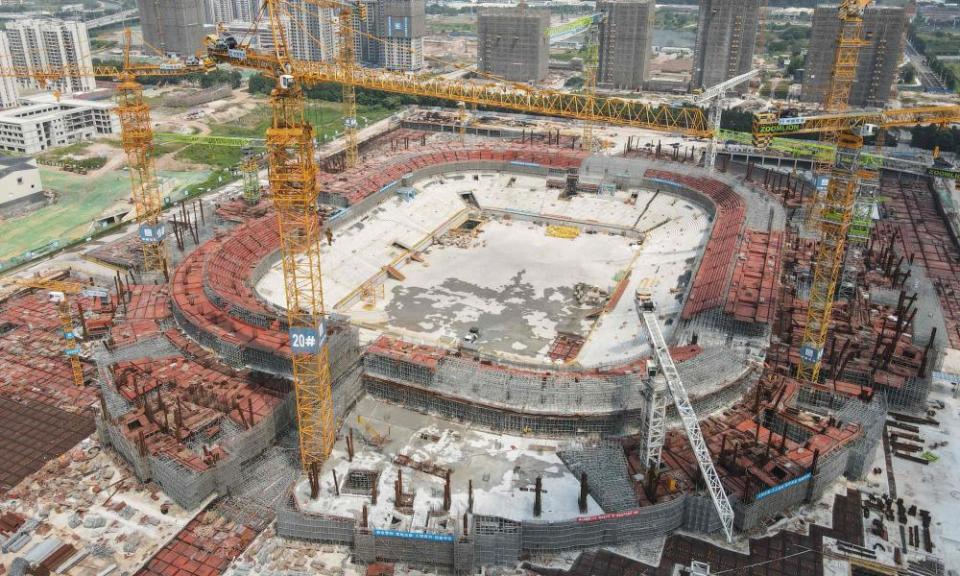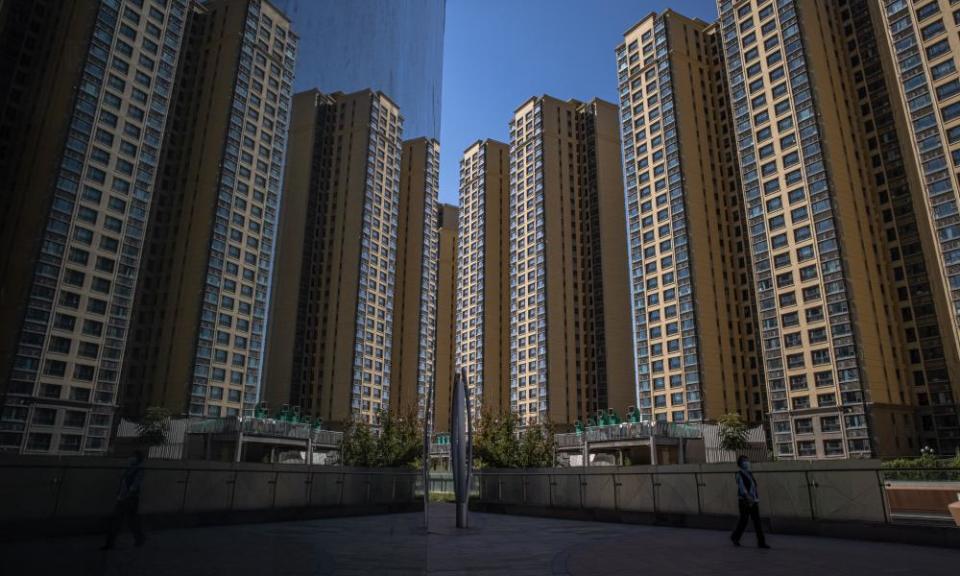How fall of property giant Evergrande sent a shockwave through China

In May 2020, Chen (not his real name) decided to invest 300,000 yuan (£34,000) in property in the north-eastern Chinese city of Shenyang. “I thought the price was not too expensive and I had some extra money so I invested it,” he said. “I thought it was going to be all right because Evergrande is such a big name and enterprise.”
Chen was following in the footsteps of countless fellow Chinese, getting in on a booming property market that had turned big cities such as Beijing, Shenzhen and Shanghai into some of the world’s most expensive, amid the huge transfer of the population from rural to urban areas.
But in the 16 months since Chen bought his off-plan apartment, Evergrande – a Fortune Global 500 company – has become the country’s most indebted developer, with more than $300bn (£220bn) in liabilities, dozens of sprawling residential projects stalled and an estimated 1.5 million unfinished apartments that it needs to deliver to investors.
The potential collapse – the culmination of years of borrowing – has sent shockwaves through the finance and property sectors, and prompted concern that it could affect China’s entire financial system, even international markets. There are also concerns about how it will affect iron ore prices. On Thursday, the Fitch Ratings agency downgraded its forecast for China’s economic growth, saying the “main factor weighing on the outlook is the slowdown in the property sector”.
Two weeks ago Evergrande issued a public statement, admitting it was facing “unprecedented difficulties” and had hired restructuring consultants, but hit back at speculation of bankruptcy.
Wednesday appeared to bring some hope, as the company announced it had reached a deal to repay interest on a domestic bond due on Thursday. But it did not announce the payment of $83.5m due in interest to international bondholders on the same day. And as the silence continued into Friday, worries were compounded by reports that its electric vehicle unit had missed payments to suppliers and salaries to some staff.
“I don’t see any alternative for the company than going through some form of debt restructuring, which will involve significant debt rescheduling, potentially a debt-for-equity swap,” said Michel Löwy, chief executive of the global banking group SC Lowy.

Evergrande’s crisis has not come without warning, and in recent years Chinese regulators have been putting the squeeze on the country’s entire property market, valued at $52 trillion by Goldman Sachs in 2019.
All over China, dozens of high-rises continually spring up, spread across spaces the size of several football fields. The rush to build has caused numerous problems, including risky finances, poor construction – dramatically demonstrated in viral footage of the mass demolition of 15 high-rises in the city of Kunming – and huge oversupply. Analysts have estimated 90 million people could be housed in the empty properties.
The value of home sales has fallen by 20% year on year in the wake of tougher regulation. In August last year, in response to growing concerns about the property market, the government introduced debt cap ratios, dubbed “three red lines”. Economist George Magnus, an associate at the China Centre at Oxford University, said the three red lines were not “a killer blow” to the industry, “but they’ll certainly have exacerbated the financial stress many developers were experiencing in a structurally weakening property market”.Magnus added that the government has sought to improve financial stability by getting developers to cut back on borrowing, and to curb the oversupply of housing: “I’m sure this had brought matters to a head, but also that this debt crisis for Evergrande and some others was coming anyway.”
In November 2018, China’s central bank named the company in a report as one of the few financial holding conglomerates that could cause systemic risk. In March 2020, the company set targets to cut debt by $23.3bn a year for three years and in August was among 12 big developers called in to speak with regulators about the new three red lines.
Over the next year Evergrande rushed through the sale of subsidiary businesses, initial public offerings and investor drives, raising tens of billions of dollars and offering massive discounts on properties to drive sales, and set a target to meet all three red lines by the end of 2022. But, according to research institute Beike, it failed to reach two targets despite paying down some debt.

With creditors across the globe now scrambling, it is the stories of the smallest investors that are among the most shocking. Earlier this year employees at Evergrande and some subsidiaries were reportedly told to give the company a short-term loan out of their own finances, or forgo their bonuses.
Some borrowed from friends and family, assuming their all-but-mandatory loan was safe. They are now among the hundreds picketing the company’s offices nationwide. Videos spread online, with crowds inside the lobby of Evergrande’s Shenzhen headquarters shouting for the return of money they earned with their own “blood and sweat”.
“Your conscience has been eaten by dogs,” said one highly distressed woman. “We sold everything we had, both of our flats, so that we could buy property with Evergrande, because you were one of the world’s top 500 companies – I have nothing left,” she told the camera.
On Thursday, Evergrande’s chairman, Xu Jiayin, said the company was giving priority to ensuring that retail investors redeemed their investment products. China’s central bank injected 110bn yuan in short-term liquidity into the financial system on the same day, the largest amount in eight months. It followed previous injections over three consecutive sessions in response to market fears over Evergrande, Bloomberg reported.
There is rampant speculation over whether the central government will step in. Under the leadership of Xi Jinping, the Chinese Communist party has been closely examining the country’s private sectors. Everything, from tech giants, individual moguls, private education and social media to ride-sharing apps, streaming platforms and the entertainment business – even actors and entertainers themselves – has been dragged through regulatory overhauls.
A common factor in these the sectors is financial and influential expansion – often globally – beyond the confines set by the party and how it expects Chinese society to run. China’s leadership has been vocal about its belief that homes are for living in, not investing in, as it works towards a goal of national “moderate prosperity”.
Magnus predicts government intervention, noting that the authorities want to make an example of Evergrande to other banks, developers and investors, but also cannot allow “a messy default in which citizens lose money and in which contagion takes the crisis outside property”.He said: “I imagine sooner or later banks and entities will take on housing stock and liabilities, and other developers will take on assets too.

“The restructuring will be aimed mainly at dividing Evergrande’s liabilities among stronger firms, so that a slimmer unit can still trade or it is gradually wound up.”
Löwy adds that there is a “real possibility” that Beijing will step in to assist the regular citizen investors and employees and local suppliers.
“I can easily see the government getting itself involved financially or from a management standpoint, to make sure those people are protected. It could even extend to local creditors,” he said.
“I don’t see that extending to offshore bond holders and creditors but certainly to suppliers and home buyers and employees.”
Löwy also speculated that if Evergrande had stopped paying its employees, it was potentially an effort to put pressure on Beijing to intervene.
Chen is not concerned about the risk to his investment, and trusts that he will get his apartment. “The earlier the better, for me. If they hand it over later, I think it doesn’t matter either,” he said. But if they do not hand it over at all? “I will let it be. I already bought the apartment, there is no use in being angry about it.”
Additional reporting by agencies

 Yahoo Finance
Yahoo Finance 